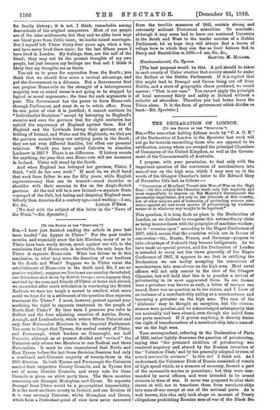[To TEE EDITOR OP THE " SPECTATOR."1 SIR,—I have just
finished reading the article in your last issue headed " An Appeal to Ulster." For the past twelve months, and especially since the late Election, many of us in Ulster have been sorely driven, much against our will, to the conclusion that if Home-rule is inevitable, the only hope for Ulster is separate Home-rule. What has driven us to this conclusion, to what may seem the desertion of our brethren in the South and West ? Suppose we in Ulster resist the establishment of Home-rule to the death (and, Sir, I am no passive resister) ; suppose we live to see our country devastated, our defenders shot down by British troops ; even suppose that. assisted by the sons and friends of Ulster at home and abroad, we succeeded after much tribulation in convincing the British Radicals we were too tough a morsel to swallow, what more could we hope for in a settlement of the question than separate treatment for Ulster ? I must, however, protest against your confining the right to separate treatment to the people of North-East Ulster ? By that term I presume you refer to Belfast and the four adjoining counties of Antrim, Down, Armagh, and Londonderry, which return fifteen Unionist and only four Nationalist Members to the Imperial Parliament. You seem to forget that Tyrone, the central county of Ulster, and Fermanagh, which borders on Connaught, are half Unionist, although as at present divided and " revised " the Unionists only return two Members to one Radical and three Nationalists. It must be also remembered that North and East Tyrone before the last three Revision Sessions had only a combined anti-Unionist majority of twenty-three in the 1900 _Election. In both Tyrone and Fermanagh the Unionists control their respective County Councils, and in Tyrone five out of seven District Councils, and every vote for these Councils is given on strict party lines. The three counties remaining are Donegal, Monaghan, and Cavan. To separate Donegal from Ulster would be a geographical impossibility. It is the most northern county in Ireland, and one division of it is very strongly Unionist; whilst Monaghan and Cavan, which from a Protestant point of view have never recovered from the terrible massacre of 1641, contain strong and extremely militant Protestant minorities. To conclude : although it may seem bad to leave our scattered Unionists in the South and West to the tender mercies of a Dublin Parliament, let us hope they will always find a haven of refuge here to which they can flee as their fathers fled to Derry and Enniskillen in 1688.—I am, Sir, &c.,.
Newtownstewart, Co. Tyrone.
SAMUEL M. MILLER.
[The best proposal would be this. A poll should be taken in each county of Ulster whether that county should be under the Belfast or the Dublin Parliament. If it is replied that this might lead to Donegal and Cavan being cut off from Dublin, and a state of geographic chaos produced, we would answer: "That is our case." You cannot apply the principle of local autonomy fairly and safely in Ireland without a reductio ad absurdum. Therefore you had better leave the Union alone. It is the form of government which divides us least.—En. Spectator.






































 Previous page
Previous page